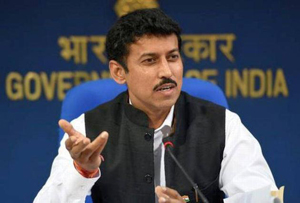New Delhi, Oct 19: Government is mulling on the issue of bringing more FDI into news channels, Minister of State for Information and Broadcasting Rajyavardhan Rathore said today while voicing concern over "quality of news" and little investment in training of journalists.
Speaking at an event organised by the CII, he said the government is talking about the concept of "bringing in more" Foreign Direct Investment (FDI) into news channels.
"Can't really say that we are going to make it happen in a given timeframe, but the very fact that we have started thinking about it, means we have started moving ahead with it," he told representatives of the media and entertainment industry.
As per present rules, 26 per cent FDI is allowed in uplinking of news and current affairs TV channels, officials said.
Rathore referred to comments made by one of the industry representatives about paucity of funds available with news channels and said that it was one of the reasons that there was not much investment into training of journalists.
"Unfortunately, because of that there is not much investment happening in training of the journalist. The quality of the journalist, the questions, the news that is being presented and we as a growing nation, we need to have journalists as fourth pillar of democracy.
"We need to have very good quality news being given out. And therefore there is need to investment into the quality of journalism itself," Rathore said.
Referring to demands that news be allowed on private FM Radio, Rathore said that with changing times policies are changing too.
There was a time when there was no news on private radio but now with Phase III expansion, this has changed, he said.
In lighter vein, Rathore recalled a conversation when I&B minister Arun Jaitley told a news anchor that the catchline of their prime time show should be "two at a time" as often more than one person speaks at the same time.
Another person then mentioned it could be windows 2015, as there are several windows on TV screens showing guests.
"One wonders if news is opened immediately on radio, you'll perhaps have a windows 2015 on radio channels as well," he said.
He added that in Phase III, All India Radio news can be broadcast verbatim. "But what we have done is, taken off a lot of things from news and therefore it has become non-news. Things like sports in a city, local events in a city. Just that religion and political news is hardcore news and we leave that out for the time being," he said.
Speaking about GST, he said the government has been trying to encourage the opposition to partner and clear the GST Bill.
He said the effort of the government would be to subsume most of the taxes like entertainment tax, local taxes etc making it easier for all.
"But as you understand it is an intensely dynamic subject, the GST itself," he added.
Rathore also added that government is considering National Film Development Corporation (NFDC) to become a single window clearance for filmmakers to shoot in India.
He said a proposal that has got the Prime Minister Narendra Modi's in principle consent is to provide financial assistance to films which participate in prestigious awards like Oscars, Cannes etc to boost their chances of winning.
He said the I&B ministry wanted to discuss this proposal with the industry. He said the government also wants industry's support in setting up of a gaming, animation and special effects institute of excellence.
Prasar Bharati CEO Jawhar Sircar, in his speech at the event, suggested that there are a huge number of smartphones in the country and broadcasters should look towards them to prepare for the future.
He suggested that a consortium of broadcasters could try to cooperate and reach the smartphones free by using the bandwidth with Doordarshan.
"In the four metropolitan cities, Delhi, Mumbai, Kolkata and Chennai, we have broadcasting signals enough to carry 20-22 channels," he said, adding that the test runs are on.
The Prasar Bharati CEO said that while there is the "sarkaari" mentality that "we will do it myself", a solution could be that a consortium could approach the government, which would be in a position to help the entire country.






Comments
Add new comment